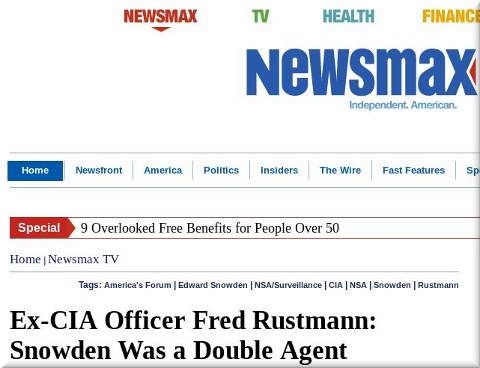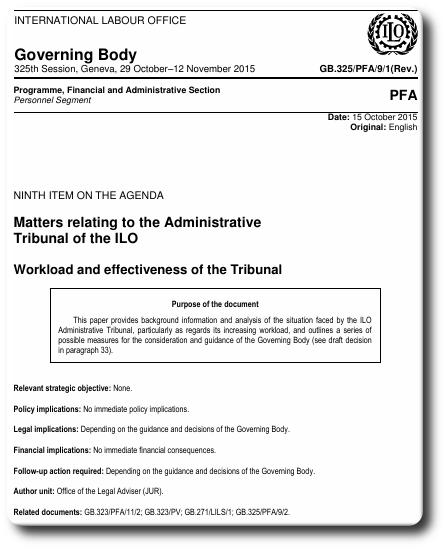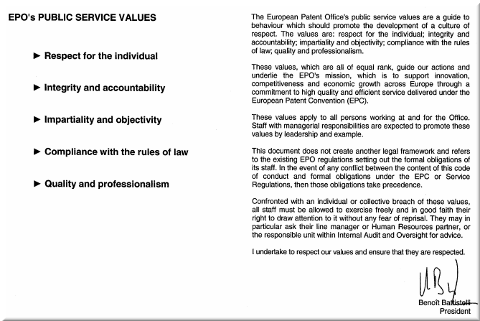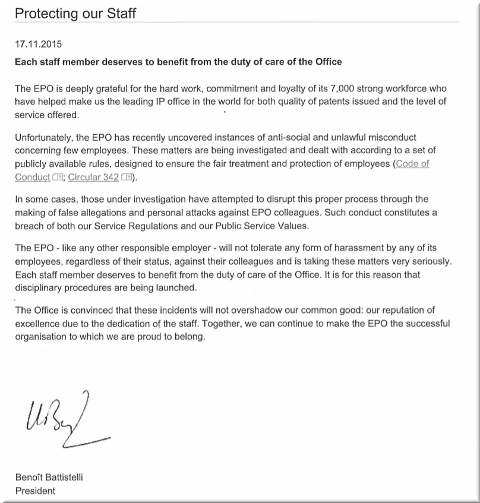04.13.16
Posted in Europe, Patents at 5:49 am by Dr. Roy Schestowitz
Vilifying the messengers

How Republican media sometimes covers Snowden revelations
Summary: A look at personal attacks, character assassination and discreditisation of people whose words challenge tactics of oppression, domination, and mass deception
In part one and part two of this series (there is more to come) we looked at methods by which Mr. Battistelli essentially engineered his EPO autocracy, having eliminated oversight several years ago and recently launched union-busting operations. It didn’t emanate/come out from vacuum and it wasn’t the fault of the EPC. There were just some loopholes/flaws in it and Battistelli was quick to exploit them over the years, in spite of warning from the unions (they spoke and published interviews with those affected). Nowadays, unlike decades ago, the EPO is known to many as an autocracy and a source of great shame to Europe (the EPO used to be a source of pride and pillar of innovation). Board 28, which is meeting secretly/privately today, recognises this and a staff survey shows that it's taking its toll on workers, leading to brain drain [1, 2, 3, 4] and massive strikes (thousands of workers legally absent and lawfully making statements against the Office’s lawlessness).
Earlier this year we showed how Battistelli brought things down to an all-time low by comparing truth-tellers to Nazis and criminals. We made a local copy of the video/audio to serve as proof that cannot be squashed with copyright claims.
Incidentally, a few days ago someone sent us the following text regarding Battistelli’s potentially libelous claims about people whom he is crushing (because they say the truth about him and his goons):
Lies, damn Lies!
On 1 March Mr Battistelli appeared in front of the French National Assembly to answer questions concerning the social unrest in the EPO. Mr Battistelli presented the audience with half-truths and several complete and utter lies. The full hearing was broadcasted and a full transcript was provided so that this time Mr Battistelli cannot claim that he was misquoted or misunderstood. The kind of misinformation we have witnessed in this hearing is nothing new for the staff representation. This has become the trademark of Mr Battistelli and of his team. Bending long established rules of law, inventing new ones that suit them or ignoring all the rules altogether while asking everyone else to follow the rules has become the normal way of functioning of this administration.
This Organisation should not be led someone who cannot distinguish between truth and untruth, someone who sees conspiracies everywhere (even by the Board 28, someone who has shown that he is not here to serve the European public pub only himself.
Mr Battistelli is so out of touch with reality, that is not fit to lead a team of boy scouts, let alone an international organisation.
Well, Board 28 (B28) is meeting today, so it might also appreciate this bit of humour:
Another conspiracy.
The claims of the Board 28 in their request to Mr Battistelli are very similar to the claims raised by staff in their spontaneous petition for strike. This seemed surprising. We investigated the matter and came to the same conclusion as Mr. Battistelli: there must be a plot. The spontaneous petition from the staff is not so spontaneous after all. The petition was in fact started by the Board 28. The reason is obvious. After being ignored for years, even the B28 now wants a strike.
If B28 wishes to prevent further strikes, then maybe it’s a good idea to start with an analysis and explanation (to Battistelli at least, despite his lack of comprehension of reality) of why Battistelli is still in power and why he has managed to surround himself only with people blindly loyal to him. As long as this nepotist reign persists, it is guaranteed that the Office will continue to lose some of its best patent examiners. It is already losing some of the bravest ones — those whose adherence to truth has cost them their jobs. B28 ought to work hard to restore their jobs and re-integrate them into the workforce.
We invite readers to send us any information they may have (or will have) about the dialogue at today’s B28 meeting. █
Permalink
 Send this to a friend
Send this to a friend
04.12.16
Posted in Europe, Patents at 11:48 am by Dr. Roy Schestowitz

Summary: A look at the actors in Europe who are pushing for more patents in more domains (patent maximalism or overpatenting) because it serves their bottom line at the expense of everybody else
SOFTWARE patents, as we pointed out in our previous post, are a dying breed in the US, even if the USPTO continues to grant them (only to see them invalidated in the courts or at PTAB [1, 2]). What good is a patent if it’s unenforceable in a court of law? It’s just a waste of time, money, and effort. Why even bother with software patent applications? Incidentally, the Jerusalem Post now notes that people question China’s patent system (it too is a waste of time/money, unless one asks the author who is from a “Strategic Patent Department”, i.e. non-producing parasite) because just like the USPTO, it has virtually no quality control. The same goes for invalid/ated (by the European courts) software patents in the EPO. Who would still promote software patents in Europe? Surely the non-producing parasites that are based in Europe. Marks & Clerk, as we noted here before, is one of the boosters of the UPC alongside other greedy opportunists who don't care about innovation, only about lawsuits (money to them, irrespective of the outcome). Unsurprisingly, they also promote software patents, which the UPC helps bolster. Last night we noticed/found new promotion of software patents in British media (despite software patents being patent-ineligible here). Who wrote it? “Graham McGlashan is a chartered and European patent attorney at Marks & Clerk” (well, that explains it, doesn’t it?). Imagine the British media giving the microphone/platform (exclusive columns without response/balance) to a British drone engines company regarding reconnaissance and political assassinations abroad. It makes no sense, or does it? It really says a lot about the media.
“Imagine the British media giving the microphone/platform (exclusive columns without response/balance) to a British drone engines company regarding reconnaissance and political assassinations abroad.”Marks & Clerk seems to be unaware of the effective ban on software patents in Europe and appeals to loopholes. It says: “Patents can provide useful protection for technical concepts. Many computer implemented inventions have been patented in the US, UK and Europe. Confusion arises because the criteria for patentability of computer implemented inventions vary between jurisdictions.
“The European Patent Office (EPO) has a test in which claimed subject matter that is novel and inventive is potentially patentable if it has a technical character. A computer program itself can potentially be patented at the EPO if it is capable of bringing about, when running on a computer, a further technical effect going beyond the “normal” physical interactions between the program and the computer on which it is run.”
That’s the “as such” loophole created by a Brit, Alison Brimelow. What’s perhaps most ludicrous about this piece from Marks & Clerk is the headline. It says: “When you write great software, don’t forget patenting” (patenting software? In Europe?!)
“Marks & Clerk doesn’t care about what’s true and what’s good for the EU (or the UK); it just cares about winning cases and doing whatever helps its own bottom line.”Well, remember that one’s “great software” can then get one sued by other companies with software patents. It’s the M.A.D. mentality, which purports that lots of countries having nuclear weapons somehow makes us all safer.
What we find disturbing about Marks & Clerk is that it keeps funding UPC propaganda events and various events that promote software patents. It’s basically an echo chamber of patent profiteers. As one tweet put it this week in relation to TTIP: “The European Business Summit : where Businessmen (paying 600€ entrance fee) meet policymakers to shape your future” (staging a coup over politics and law while denying opponents of the coup any access). It’s more or less the same with UPC events (which are often even a lot more expensive to attend). If we continue to allow the likes of Bristows and Marks & Clerk decide on European law, we’ll all suffer in the long run. Marks & Clerk doesn’t care about what’s true and what’s good for the EU (or the UK); it just cares about winning cases and doing whatever helps its own bottom line. This is bad advice regarding software patents, but it’s good advice for Marks & Clerk’s own accounting. It’s just a British company with a Microsoft-powered Web site (which is rare nowadays) and what it does negatively affects software developers in Britain and abroad. █
Permalink
 Send this to a friend
Send this to a friend
Posted in GNU/Linux, IBM, Microsoft, Patents, Samsung at 10:58 am by Dr. Roy Schestowitz

Summary: Nearly two years after the historic Alice decision companies that rely a great deal on software patents (and patent royalties) are losing their prominence in the US patent system
According this new IAM report, Samsung is now number 1 in US patents (total). IBM is falling down the ladder rather quickly amid layoffs and it is worth mentioning that IBM is now a patent aggressor. It attacks legitimate companies, with software patents as a weapon [1, 2] (typical patent strategy of failing companies). Speaking of failing companies, Microsoft is at number 4 in its home country, having lost momentum not only as a company (now mostly a leech and patent parasite) but also as a patent applicant.
The good news about all this is that traditionally, as many sites correctly point out, Korean companies are not aggressive with patents. Samsung is no exception to this. Morever, Samsung is a producing company (hardware), so not so many of its patents pertain to software. Samsung uses a lot of Linux in its systems; in some cases it develops its own operating systems such as Bada or Tizen, rather than blindly rely on Android.
Another IAM report admits that it was wrong. It previously claimed that the patent troll of Ericsson was being renamed/reshaped again, but this turns out to be false. IAM then says that some people in Taiwan consider doing the same thing (creating a troll of their own, like Microsoft Licensing or Unwired Planet in the case of Ericsson), but it mostly quotes people who profit from litigation, not technologists. Well, that’s just IAM…
Looking at some more credible patents-centric sites, we quickly learn of more bubble-bursting in this area of patenting. “The decision by Judge Dyk and joined by Chief Judge Prost and Judge Taranto affirms a lower court’s dismissal on-the-pleadings of GTG’s patent infringement claim,” says Patently-O. “The holding is that the claimed method for analyzing DNA for linkage disequilibrium is ineligible for as effectively claiming a law of nature. The basic idea stems from the inventors discovery that coding regions (exons) typically correlate with “linked” certain non-coding regions (introns). [...] GTG is an Australian company that had previously sued a few dozen companies for infringing the ‘179 patent. The claims have been reexamined (at Merial’s request) and patentability confirmed.”
Nowadays, software patents aren’t quite as potent as before (in US courts/PTAB) and it shows. We hope that the coming few years’ decisions will send out the signal that there’s little incentive to software patenting, irrespective of USPTO lenience. █
Permalink
 Send this to a friend
Send this to a friend
Posted in Europe, Patents at 7:50 am by Dr. Roy Schestowitz
English/Original
Article as ODF
Publicadoen Europa, Patentes at 3:51 pm Por el Dr. Roy Schestowitz
Tanto abuso gerencial que las cortes estan simplemente abrumadas

Reportaje completo aqui
Sumario: Como el torrente de quejas contra la EPO en la Organización Internacional del Trabajo (ILO) básicamente ahoga al tribunal y asegura que los empleados de la EPO no esperen justicia, al menos no por muchos años por venir
CUANDO el monarca en jefe de la EPO, Sr. Battistelli, despide a los representantes de los empleados (porque piensa que le gusta) pretende que tienen un proceso (jurídico) en que basarse, incluso si la ILO toma muchos años en tomar casos (la gente debe buscar empleo alternativo en el interim) y los resultados son desánimadoramente decepciónantes.
En la primera parte nos fijamos en algunos de los mecanismos que el propio Battistelli creó para los despidos, utilizando todo tipo de criterios vagos (como ser percibido como desleales o no lo suficientemente educado para cada miembro del personal). texto reciente que nos alcanzó explica por qué la ILO es incapaz de controlar a la monarquía fuera-de-control de Battistelli:
¿Desestimará la ILO a la EPO?
Los desarrollos actuales en la ILO-AT son otra amenaza a la inmunidad de la OEP. La gran mayoría de las quejas presentadas por el personal en contra de su empleador se pierden. Tal vez esto no debería ser una sorpresa, dado que los jueces del Tribunal se pagan sobre una base de caso por caso por la organización demandada. Parecería que la ILO-AT y la OEP son un matrimonio hecho en el cielo. Curiosamente, sin embargo, el Tribunal no parece estar contento con la EPO. Se ha publicado recientemente un documento en el que el Tribunal culpa a la EPO por sus retrasos cada vez mayores. Está claro que los mecanismos de resolución de conflictos internos de la EPO se han vuelto cada vez más disfuncional, véase, por ejemplo CA / 21/15, que señala 13-15 y 59-64 que muestran una extremadamente pequeña tasa de éxito. Sin embargo, al hacerlo, el Tribunal pasa en silencio sobre los cambios en su jurisprudencia que contribuyen fuertemente a su cartera de pedidos como exigiendo que cada miembro del personal que se ve afectada negativamente por una decisión general presentar su propia queja individual en lugar de aceptar una queja para todos. La falta de consistencia y una tendencia a descartar los casos en cuestiones de procedimiento en lugar de decidir sobre la sustancia más crear más inseguridad jurídica y contribuir a un aumento en el número de recursos. En una propuesta de modificación de sus Estatutos, que se presentará al Consejo de Administración de la ILO en junio, el Tribunal ahora planea retirar su aceptación para las organizaciones cuando encuentra que su
mecanismos internos de resolución de conflictos son insuficientes. No sólo eso: también tiene previsto que cree la autoridad para expulsar a las organizaciones existentes “cliente” que no cumplen sus condiciones. Parece claro que la EPO es primero en la fila. Si es así, la EPO será la primera organización en ser expulsada del Tribunal. Esto sería una gran vergüenza. La Organización se vería obligado a ofrecer una alternativa rápida, a menos que quiere ver a su inmunidad levantada por los tribunales nacionales para las que sería muy claro que el personal de la EPO ya no tienen acceso a la justicia. Dado que el acceso a la ILO-AT se fija en el EPC (artículo 13 del CPE), un cambio de este tipo requeriría una conferencia diplomática ..
En sumario lo de arriba sugiere que hay ataduras financieras entre la ILO y la EPO y no hay voluntad de justiica, simplemente la percepción. Y empeora:
Injusticia Sumaria
La EPO fue noticia al negarse a aceptar el fallo de un tribunal holandés de segunda instancia y anunciando – a través de un vicepresidente – que sería incluso ignorar el fallo del Tribunal Supremo holandés, que debe fallo no sea a su favor. Un desprecio similar se muestra por la OIT-AT en su sentencia de 3563, relativa a una solicitud de revisión de la anterior Sentencia 3297 (despido por acusación de fraude). El Tribunal confirmó el despido. Después de la sentencia anterior el autor fue absuelto de las mismas acusaciones por un tribunal penal holandés. Se pidió a la OIT-AT (un tribunal administrativo que se limita a los procedimientos escritos, sin una investigación y sin audiencias) que reconsidere su fallo a la luz de los hallazgos de la corte holandesa especializada (penal) que es mucho más profundo en su funcionamiento . El Tribunal consideró que las conclusiones de la corte holandesa eran irrelevantes y se negaron reconsiderar su posición. La solicitud de revisión fue sumariamente (sic) desestimó.
¿Cómo es esto justicia y cómo puede el Consejo administrativo esperar la percepción de justicia? El núcleo del asunto es, la gerencia de la EPO despide a la gente de manera injustificada, luego pretende que ellos pueden encontrar justicia en la ILO — algo que ellos claramente no pueden (abogados de la SUEPOreciéntemente hicieron constructivas sugestiones a Guy Ryder, Director General de la ILO), creciéntemente por el altísimo número de quejas. Mientras más abusivo los chacales de Battistelli se convierten, lo más encumbrados la ILO lo es y menos probable que los miembros despedidos encuéntren justicia alli. Algunos tirarán la toalla. Desesperanza y sensación de abandono se hán convertido en herramiénta de dominación y opresión. La atmósfera de temor tiene un efecto paralizante cuando no hay recursos a los principios naturales de justicia.
Permalink
 Send this to a friend
Send this to a friend
Posted in America, Europe, Patents at 7:41 am by Dr. Roy Schestowitz
English/Original
Article as ODF
Publicado en America, Europe, Patentes at 7:27 am por el Dr. Roy Schestowitz

Sumario: Las patentes on triviáles/o abstractas ideas implementadas en código todavía son una barrera mayor para la adopción de Free/libre software (FOSS) y miramos quienes las están promoviéndo, conjuntamente con la UPC en elcaso de Europa
VARIAS oficinas de patentes, la EPO y la USPTO por ejemplo, tratán duramente de otorgar patentes de software, incluso bajo FOSS Fuerza tiene esta nueva interesante artículo, que necesitamos más. No hay muchos sitios de software libre se molestan discutiendo las patentes de software más (Groklaw ha estado inactivo durante años) y todavía lo consideran el # 1 sujeto cuando se trata de la dominación de software libre (no todo el mundo está de acuerdo con el nosotros), por lo tanto, lo cubrimos con tanta frecuencia.oposición de las cortes. Que les importa mientrase ellas sigan recibiéndo dinero y dejen que los acusados se las arreglén con el caos y sus honorarios legales (¿una externalidad a las oficinas de patentes?) El Presidente de la EPO no tiéne idea acerca de ello y el antiguo Director de la USPTO es ahora un cabildero por las patentes de sofware, las que son verboten en Europa. Que podrido estado de cosas. El problema principal es que los desarrolladores de Free/libre (más que desarrolladores de software propietario) tienen sus projectos cerrados (extinguídos) por las patentes de software. Esto sucede de una manera silenciosa frecuéntemente, por prospectivas demandas que las silencian o porque hay temor de retalación de parte del acusador (a veces un troll de patente s, otras una compañía real como Shazam [1, 2, 3]).
“El problema principal es que los desarrolladores de Free/libre (más que desarrolladores de software propietario) tienen sus projectos cerrados (extinguídos) por las patentes de software.”
FOSS Force tiene esta nuevo interesante artículo, del que necesitamos más. No muchos sitios de software libre se molestan más discutiendo las patentes de software (Groklaw ha estado inactivo durante años) y todavía se consideran el # 1 en la materia cuando se trata de la dominación de software libre (no todo el mundo está de acuerdo con el nosotros), por ello, lo cubrimos con tanta frecuencia.
“Noventa y nueve por ciento de los votos emitidos hasta ahora indica que nuestros lectores piensan que las patentes de software siguen siendo un problema serio, incluso si la situación ha mejorado duránte los últimos años.” – FOSS Force
“No hay duda,” FOSS Force escribió, “que ha habido muchos avances en el frente de patentes que han sido beneficiosos desde el punto de vista técnico gratuito. Hubo la sentencia del Tribunal Supremo del 2014 en Alice Corp. vs. CLS Bank, lo que hizo de inmediato una serie de patentes imposibles de cumplir. Esta decisión invalidó las denominadas patentes de software “abstracto”, que básicamente buscaban la protección de patentes por simplemente moviendo procedimientos establecidos anteriormente manualmente, a un ordenador (es decir, de contabilidad “a un ordenador”). Otros avances incluyen la decisión en le caso del vendedor online Newegg para tomar todas las reclamaciones de infracción de patentes de años atrás en disputa a la corte en lugar de ´arreglar´. Aunque los resultados de esta decisión han dado lugar a una mezcla de resultados, con notables victorias y derrotas, es, sin duda, hizo que los trolls lo piensen dos veces antes de amenazar la compañía.”
Aquí están los números basados en una nueva encuesta: “Pusimos la encuesta en nuestra página principal la mañana del Jueves.Noventa y nueve por ciento de los votos emitidos hasta ahora indica que nuestros lectores piensan que las patentes de software siguen siendo un problema serio, incluso si la situación ha mejorado duránte los últimos años.
Hay alguna percepción de que las cosas estan mejorando, pero ¿dónde? Talvez en los EE.UU., debido a Alice. Pero ¿qué acerca de Europa? Bristows LLP se encuentra actualmente promoviéndo a la UPC (y por extensión patentes de software) y uno de sus empleados, quién habitualmente las defiende, acaba de publicar un artículo acerca del proyecto de ley de los EE.UU. Que aboga ir contra los trolles de patentes (o la sede de los juicios de patentes), en lugar de la esfera de patentes, he aquí una distracción del problema principal.who habitually defends software patents, has just published an article about the US bill which advocates going after patent trolls (or patent lawsuit venue) instead of patent scope, hence somewhat of a distraction from the core problem. Para citar una porción:
Actualmente, titular de una patente puede iniciar una acción por violación de patente en cualquier distrito donde el demandado reside o hace negocios (es decir, donde están disponibles sus productos o servicios) (véase la decisión del Circuito Federal de 1994 en Beverly Hills Fan Company v Royal Sovereign) y VE Sosteniendo v Johnson gas (Fed Cir 1990). Las reglas han hecho posible que el Distrito Este de Texas, por ejemplo, para convertirse en tan popular (para una entretenida de 11 minutos, ver de John Oliver semana pasada Noche de Patentes). El objetivo de la Ley de VENUE es limitar la capacidad de los titulares de patentes a abusivamente tienda de foro (que puede ser interpretado como detener los trolls de patentes de la focalización de jueces amigables al titular de la patente). Una legislación similar fue introducida en la Ley de Innovación (H. R. 9 – véase también aquí), pero que se ha estancado (al igual que la Ley de Patentes compañero (S.1137) antes de que el Senado). Algunos comentaristas consideran que la Ley de VENUE es un intento de obtener algún tipo de reforma de las patentes a través del Congreso número 114 antes de todo el mundo pierde interés para la elección. Por dedicarse a un solo tema, en lugar de varios, esto puede aumentar sus posibilidades de éxito.
Esto pueda obstaculizar a los trolles (no completamente detener/aplastar sus extorsiónes/chantájes), peor aun no hace nada contra la esfera de patentes. Mientras tanto, temprano hoy IAM dijo “NPE” en vez de troll de patentes (si, de nuevo) en relación con el lejano Oriente. Para citar: “En Taiwan, las compañías están observando el ambiente en los EE.UU. Tan cerca que puedan – algunos de ellos han sido objetivos frecuentes de litigación de parte de los NPEs (leáse TROLLES). Ahora hay una cauta creencia que eso ya pasó y que la continua aserción de las NPEs continuará declinando. Hay evidencia que algunas compañías Taiwanesas perciben el riesgo de moverse a Europa, con entidades de la isla aumentando sus aplicaciones por patentes Europeas por un 12 % el año pasado. Muchos otros, sin embargo toman el aproche de espera-y-ve, por lo menos por el costo considerable envuelto en las aplicaciones Europeas. Con le tratado UPC en la balanza, esa precaución es buena.
Como recordatorio, he aquí el por qué no pueden decir “troll” y en lugar dicen NPE (eleditor en jefe niega el problema ya que los trolls son sus financistas). Seguro que parece a las empresas Asiáticas también están preocupados por los trolls de patentes de los Estados Unidos. Observe la parte al final acerca de la UPC, lo que abriría Europa para una gran cantidad de litigios por parte de los trolls de patentes (incluso desde el extranjero). No parece ser una causa de alarma entre los abogados de patentes, que simplemente ganarán con ello. Steve Lundberg, un fuerte defensor de las patentes de software desde hace muchos años, está feliz de ser bendecidos por IAM (otra voz alta de los proponentes de las patentes de software, vea la columna derecha de esta nueva entrada) y ahora acícala a Schecter de IBM (ahora un agresor con las patentes de software, como varias demandas recientes muestran), que esta evidentemente satisfecho con eso. Todos los grupos de presión, grupos de expertos, los expertos de patentes, etc., que muestran sin esfuerzo su fuerte sesgo en el tema no deben ser ignorados, ya que se benefician de ello y tratan de cambiar la percepción/consenso público. IAM es pagado por los agresores y los trolls (incluso los más grandes y notorios como MOSAID); que promueve una patentes de software en el tema deste mes de la revista. Lo mismo ocurre con la EPO (véase por ejemplo la propaganda UPC en la página 4 de esta publicación EPO anunciado recientemente); ¿cuándo la EPO dejará de actuar como un grupo de presión de la UPC, lo que ha hecho durante muchos años?
Avergonzar a aquellos que promueven las patentes de software sin haber escrito una sola línea de código en toda su vida no es ser confrontaciónal o grosero. Es necesario porque hay un golpe en marcha y menos que los desarrolladores de software (no necesariamente sólo FOSS) se levánten y luchen de nuevo se tendrá que pagar el precio en el largo plazo. Su dinero fluirá a los abogados de patentes, los trolls de patentes y monopolios de software.
Permalink
 Send this to a friend
Send this to a friend
04.11.16
Posted in Europe, Patents at 8:00 am by Dr. Roy Schestowitz
So much managerial abuse that courts are simply overwhelmed

Full report here
Summary: How the torrent of EPO complaints at the International Labour Organisation (ILO) basically clogs up the Tribunal and ensures that no EPO staff can expect justice, at least not for many years to come
WHEN the EPO‘s monarch in chief, Mr. Battistelli, sacks staff representatives (because he feels like it) he pretends they have an appeal process (juridical) to fall back on, even if the ILO takes many years to take on cases (people must seek alternative employment in the interim) and the outcome is often disappointingly biased.
In part one we looked at some of the mechanisms which Battistelli himself created to let him dismiss anyone using all sorts of vague criteria (like being perceived as disloyal or not sufficiently polite to every member of staff). Recent text that reached us explains why ILO is incapable of making up for Battistelli’s out-of-control monarchy:
Will ILO-AT dismiss the EPO?
The current developments at the ILO-AT are another threat to the immunity of the EPO. The vast majority of the complaints brought by staff against its employer are lost. Maybe this should not come as a surprise, given that the Tribunal’s judges are paid on a case-by-case basis by the defendant organisation. It would seem that the ILO-AT and the EPO are a marriage made in heaven. Curiously, however, the Tribunal does not seem to be happy with the EPO. It recently issued a document in which the Tribunal blames the EPO for its increasing backlogs. It is clear that the EPO’s internal conflict resolution mechanisms have become ever more dysfunctional, see e.g. CA/21/15 which points 13-15 and 59-64 that show a vanishingly small success rate. However, in doing so the Tribunal passes in silence over changes in its jurisprudence that strongly contribute to its backlog like demanding that each staff member who is negatively affected by a general decision file his or her own individual complaint rather than accepting one complaint for all. A lack of consistency and a tendency to dismiss cases on procedural issues rather than to decide on the substance further create further legal uncertainty and contribute to an increase in the number of appeals. In a proposal to amend its Statutes, to be submitted to the ILO Governing Body in June, the Tribunal now plans to withdraw its acceptance for organisations when it finds that their
internal conflict resolution mechanisms are insufficient. Not only that: it also plans to give itself the authority to expel existing “client” organisations that do not fulfil its conditions. It seems clear that the EPO is first in line. If so then the EPO would be the first organisation ever to be ejected from the Tribunal. This would be a major embarrassment. The Organisation would be obliged to provide an alternative fast, unless it wants to see its immunity lifted by national courts for which it would be very clear that staff in the EPO no longer have access to justice. Because access to the ILO-AT is fixed in the EPC (Article 13 EPC), such a change would require a diplomatic conference..
In short, the above suggests that there are financial strings between ILO and the EPO and there’s no real commitment to justice, just the perception thereof. And it gets worse:
Summary injustice
The EPO made headlines by refusing to accept the ruling of a Dutch court of second instance and announcing – through a Vice-President – that it would even ignore the ruling of the Dutch Supreme Court, should that ruling not be in its favour. A similar disdain is shown by ILO-AT in its Judgment 3563, concerning an application for review of the earlier Judgment 3297 (dismissal on accusation of fraud). The Tribunal upheld the dismissal. After the earlier judgment the complainant was acquitted of the same accusations by a Dutch criminal court. He requested the ILO-AT (an administrative tribunal that limits itself to written procedures, without an investigation and without hearings) to reconsider its judgment in the light of the findings of the Dutch specialised (criminal) court that is much more thorough in its workings. The Tribunal considered that the findings of the Dutch court were irrelevant and refused reconsider its position. The application for review was summarily (sic) dismissed.
How is this justice and how can the Administrative Council hope for the perception of justice? The core issue is, the EPO’s management gets people thrown out of the Office in an unjustifiable fashion, then pretends they can find justice at ILO — something which they clearly cannot have (SUEPO lawyers recently made constructive suggestions to Guy Ryder, the Director General of ILO), increasingly so because of the high volume of complaints. The more abusive Team Battistelli becomes, the more over-encumbered ILO becomes and the less likely a disenfranchised member of staff is to find justice there. Some would not even bother anymore. Hopelessness and helplessness thus become a tool of domination and oppression. The atmosphere of fear has a paralyzing effect when there’s no recourse to the principles of natural justice. █
Permalink
 Send this to a friend
Send this to a friend
Posted in America, Europe, Patents at 7:27 am by Dr. Roy Schestowitz

Summary: Patents on trivial and/or abstract ideas implemented in code still a major barrier to Free/libre software (FOSS) adoption and we look at who’s promoting them, alongside the UPC in the case of Europe
VARIOUS patent offices, the EPO and USPTO for example, try hard to grant software patents even when the courts oppose. What do they care as long as they get their money and let the defendants deal with all the chaos and foot the legal bills (an externality to the patent offices)? The EPO’s President is totally clueless about it and the former Director of the USPTO is now a lobbyist for software patents, which are verboten in Europe. What a rotten state of affairs. The main problem is, Free/libre software developers (more so than proprietary software developers) have their projects literally killed (shut down) by software patents. We gave many examples of this over the years. This often happens quietly, either because the prospective plaintiff demands silence or because there’s fear of retaliation from the plaintiff (sometimes a patent troll and sometimes a real company like Shazam [1, 2, 3]).
“The main problem is, Free/libre software developers (more so than proprietary software developers) have their projects literally killed (shut down) by software patents.”FOSS Force has this interesting new article which we need more of. Not many FOSS sites even bother discussing software patents anymore (Groklaw has been inactive for years) and we still deem it the #1 subject when it comes to FOSS domination (not everyone agrees with us), hence we cover it so frequently.
“Ninety-one percent of the votes cast so far indicate our readers think software patents remain a serious issue, even if the situation has somewhat improved over the last several years.”
– FOSS Force“There is no doubt,” FOSS Force wrote, “that there have been many developments on the patent front that have been beneficial from a free tech standpoint. There was the 2014 Supreme Court ruling in Alice Corp. vs. CLS Bank, which immediately made a slew of patents unenforceable. This decision invalidated so-called “abstract” software patents, which basically sought patent protection for merely moving established but previously non-computer procedures to a computer (i.e., bookkeeping “on a computer”). Other developments include online retailer Newegg’s decision several years back to take all disputed patent infringement claims against it to court instead of settling. Although the results of this decision have led to a mixed bag of results, with notable wins and losses, it’s undoubtedly caused the trolls to think twice before threatening the company.”
Here are some figures that are based on a new poll: “We quietly put the poll up on our front page on Thursday morning. Ninety-one percent of the votes cast so far indicate our readers think software patents remain a serious issue, even if the situation has somewhat improved over the last several years.”
There is some perception that things are improving, but where? Maybe in the US, owing to Alice. But what about Europe? Bristows LLP is nowadays promoting UPC (and hence, by extension, software patents) and one of its employees, who habitually defends software patents, has just published an article about the US bill which advocates going after patent trolls (or patent lawsuit venue) instead of patent scope, hence somewhat of a distraction from the core problem. To quote a portion:
Currently, a patentee can commence a patent infringement action in any district where the defendant resides or does business (i.e. where its products or services are available) (see Federal Circuit’s 1994 decision in Beverly Hills Fan Company v Royal Sovereign ) and VE Holding v Johnson Gas (Fed Cir 1990). The rules have made it possible for the Eastern District of Texas, for example, to become so popular (for an entertaining 11 minutes, see John Oliver’s Last Week Tonight on Patents). The goal of the VENUE Act is to limit the ability for patentees to abusively forum shop (which can be interpreted as stopping patent trolls from targeting patentee friendly courts). Similar legislation was introduced in the Innovation Act (H.R. 9 – see also here), but that has stalled (as has the companion PATENT Act (S.1137) before the Senate). Some commentators consider that the VENUE Act is an attempt to get some form of patent reform through the 114th Congress before everyone loses interest to the election. By dedicating itself to only one issue, instead of several, this may increase its prospects of success.
This might help impede trolls (not altogether stop them or squash their extortion/rackets), but it does nothing whatsoever to tackle issues pertaining to patent scope. Meanwhile, earlier today IAM said “NPE” instead of patent troll (yes, again!) in relation to the far east. To quote: “In Taiwan, companies are watching the US environment as closely as ever – some of the biggest names among them have been frequent targets of NPE litigation. Now, there’s a cautious belief that this threat has already peaked and that aggressive NPE assertion will continue to decline. There’s evidence that some Taiwan companies perceive some of the risk shifting to Europe, with entities from the island upping their applications for European patents by about 12% in the past year. Many others, however, are taking more of a wait-and-see approach, not least because of the considerable cost involved in European filings. With the UPC agreement currently hanging in the balance, that caution may well be warranted.”
As a reminder, here's why they can't say "troll" and instead say NPE (editor in chief denies the issue and trolls are a funding source). It sure looks like Asian companies too are worried about US patent trolls. Notice the part at the end there about the UPC, which would open Europe to a lot of litigation by patent trolls (even from abroad). It doesn’t seem to be a cause for alarm among patent lawyers, who simply stand to gain from it. Steve Lundberg, a loud proponent of software patents for many years now, is happy to be blessed by IAM (another loud of proponent of software patents, see the right column in this new post) and he now grooms Schecter from IBM (now an aggressor with software patents, as several recent lawsuits show), who is evidently pleased with that. All those lobbyists, think tanks, patent pundits etc. who effortlessly show their strong bias on the topic oughn’t be ignored because they profit from it and they try to change the public perception/consensus. IAM is paid by the aggressors and the trolls (even the big and notorious ones like MOSAID); it still promotes software patents in this month's magazine/issue. So does the EPO (see for example the UPC propaganda in page 4 of this newly-advertised EPO publication); when will EPO stop acting like a UPC lobbyist, having already done so for many years?
Shaming of those who are promoting software patents without having written a single line of code in their whole life isn’t confrontational or rude. It’s necessary because there’s a coup going on and unless software developers (not necessarily just FOSS) stand up and fight back they’ll pay the price in the long run. Their money will flow to patent lawyers, patent trolls, and software monopolists. █
Permalink
 Send this to a friend
Send this to a friend
Posted in Europe, Patents at 5:59 am by Dr. Roy Schestowitz
English/Original
Article as ODF
Publicadoen Europa, Patentes at 3:51 pm Por el Dr. Roy Schestowitz

Sumario: Una nueva serie que en retrospectiva mira como Battistelli apiló la cubierta no sólo al aplastar la vigilancia pero también al amasar instrumentos de coerción contra los empleados, con varios pretextos para despedirlos
Al final de la semana pasada compátimos una página de la CoC de la EPO. Hay mucho más que decir al respecto y este largo post dará ayudará a la EPO con transparencia, la que Battistelli ama tanto que presume de ello (sin hacer nada por el estilo).
Aquí es la página/hoja en su totalidad:

Como recordatorio, en palabras de un lector, un montón de esto se relaciona con las actividades antisindicales que hemos estado viendo desde finales de 2015 (que realmente se intensificaron en ese momento pero no empezaron allí). Esto es lo que Battistelli y col empujado a través de personal:

Lo de arriba fué una culminación de algo que él había estado cocinándo hace rato. Consideren el pleno CoC:
Europaisches Patentamt
European Patent Office
Office européen des brevets
Valores del servicio público de EPO
-El respeto por el individuo
-La integridad y la rendición de cuentas
-La imparcialidad y la objetividad
-El cumplimiento de las normas de derecho
-Calidad y profesionalismo
Los valores del servicio público de la Oficina Europea de Patentes son una guía para el comportamiento que debe promover el desarrollo de una cultura de respeto. Los valores son: el respeto por el individuo; integridad y rendición de cuentas; imparcialidad y objetividad; el cumplimiento de las normas de derecho; calidad y profesionalismo.
Estos valores, que son todos de igual rango, guían nuestras acciones, ya que apoyan la misión de la EPO, que es apoyar la innovación, la competitividad y el crecimiento económico en toda Europa a través de un compromiso de alta calidad y un servicio eficiente entregado en virtud del Convenio sobre la Patente Europea (EPC)
Estos valores se aplican a todas las personas que trabajan en y para la Oficina. Se espera que el personal con responsabilidades de gestión para promover estos valores por el liderazgo y el ejemplo.
Este documento no crear otro marco legal y se refiere a las regulaciones existentes de EPO que establecen las obligaciones formales de su personal. En el caso de cualquier conflicto entre el contenido de este código de conducta y obligaciones formales en virtud del Reglamento EPC o servicio, entonces esas obligaciones tienen prioridad.
Enfrentado a la infracción individual o colectiva de estos valores, todo el personal debe poder ejercer libremente y de buena fe su derecho a llamar la atención sobre ella sin temor a represalias. En particular, podrán pedir a su supervisor o compañero de Recursos Humanos, o la unidad responsable de Auditoría Interna y Control para el consejo. Me comprometo a respetar nuestros valores y asegurarse de que se respeten.
Benoît Battistelli
Presidente
Respeto Por El Individuo
Los servicios prestados por la Oficina son el resultado del trabajo realizado por los miembros del personal cualificado y motivado. Por consiguiente, la Oficina reconoce el valor individual de cada empleado. El respeto mutuo, la dignidad, el respeto de los derechos humanos, no discriminación y la promoción de la diversidad son nuestros principios rectores.
Nuestras Palabras Clave
• DIGNIDAD
• NO DISCRIMINACIÓN
• TOLERANCIA
• CONFIANZA Y LA FIABILIDAD
• ESCUCHAR Y COMPRENDER
• CORTESÍA
• APERTURA
• DIÁLOGO
• SALUD
• LA SEGURIDAD
Nuestro Enfoque
Compartimos el compromiso de la comunidad internacional de respetar los derechos humanos.
Nos esforzamos por crear un ambiente de trabajo marcado por el respeto mutuo.
El respeto mutuo, la confianza y la capacidad de escuchar son elementos indispensables en nuestras relaciones profesionales. habilidades y talentos de cada individuo merece ser reconocido.
Tomamos las medidas necesarias para proporcionar un entorno de trabajo seguro y saludable.
Buscamos promover la diversidad y la igualdad de oportunidades entre los empleados.
Nos hemos comprometido a no permitir que se den situaciones que podría ser perjudicial para la dignidad de nuestros colegas. Hacemos todo lo posible para evitar cualquier tipo de discriminación o acoso.
NTEGRIDAD Y RESPONSABILIDAD
La integridad es un criterio irrenunciable para nuestra conducta profesional. Implica actuar con responsabilidad, rendición de cuentas, la lealtad, discreción y sentido común. Nos resistimos a todas las formas de corrupción.
Nuestras Palabras Clave
• HONESTIDAD
• LEALTAD
• EQUIDAD
• CONFIDENCIALIDAD
• EJEMPLO
Nuestro enfoque
Actuamos con honestidad, responsabilidad y discreción.
Actuamos con lealtad y exclusivamente en interés de la Oficina. Llevamos a cabo nuestras tareas bajo la autoridad del Presidente de la Oficina, a excepción de las responsabilidades o funciones específicas expresamente establecidas en el Reglamento EPC o servicio.
Respetamos el ámbito de nuestras responsabilidades y de las tareas que se nos confían. Cuando la delegación de tareas, seguimos siendo responsables de su ejecución y resultados, y por lo tanto los administradores de ejercer la supervisión y el control adecuado.
Respetamos la confidencialidad de la información: no revelamos la información confidencial recibida en el curso de nuestro trabajo a personas no autorizadas, ni la usamos para nuestro propio beneficio o en detrimento de la Oficina.
Nuestro deber hacer nuestro trabajo a la mejor de nuestras capacidades también implica la obligación de compartir con nuestros colegas de la información necesaria para llevar a cabo sus propias funciones.
Estamos comprometidos con la lucha contra todo tipo de fraude.
Somos cuidadosos en nuestras comunicaciones externas y respetamos a nuestros deberes de tacto y discreción de la Oficina. En particular, nos abstendremos de hacer una declaración que podría ser perjudicial para él.
Imparcialidad y objetividad
La Oficina y su personal deben permanecer independiente de todos los gobiernos, las autoridades, organizaciones o personas ajenas a la organización. Nuestra conducta debe ser imparcial y reflejan que la independencia. Abordamos situaciones que pudieran afectar nuestra objetividad.
Nuestras Palabras Clave
• INDEPENDENCIA
• NEUTRALIDAD
• IGUALDAD DE TRATO
• INMUNIDAD
Nuestro enfoque
Buscamos asegurar que nada de lo que ocurre bajo nuestra responsabilidad es o podría parecer un acto directo o indirecto de apoyo preferente de un grupo político, económico, ideológico o religioso.
Nos abstendremos de hacer o decir cualquier cosa que pueda llamar a nuestra imparcialidad y objetividad en tela de juicio.
Nuestras acciones cuando se toman decisiones o se razonada proyectos principales.
Tenemos que ser imparcial y objetivo. Somos conscientes del riesgo de posibles conflictos de intereses, ya sea real o aparente. Siempre que sea posible, los evitamos; donde no, damos a conocer y administrarlas.
Regalos u otros favores podrían comprometer nuestra imparcialidad profesional. Por lo tanto no solicitamos ninguna. Y, sin el permiso del Presidente, no aceptamos ninguno?
CUMPLIMIENTO DE LAS NORMAS DE DERECHO
La Oficina tiene su propio sistema legal, que deben ser respetados.
La Oficina y su personal deben respetar las leyes nacionales aplicables del país en el que están y deben cumplir con sus obligaciones legales y financieras.
Nuestras palabras clave
• LEGALIDAD
• JUSTICIA
• DERECHOS Y OBLIGACIONES
Nuestro enfoque
Respetamos la letra y el espíritu de las normas y reglamentos de la Oficina.
Aplicamos estas reglas y regulaciones justa y de buena fe.
Actuamos con profesionalidad y sentido de la responsabilidad social en la observación de las leyes aplicables, y respetando las costumbres y tradiciones de los países en los que trabajamos, lo que contribuye de forma responsable para el bienestar de la sociedad.
Nuestros privilegios e inmunidades no nos impedirá el cumplimiento de nuestras obligaciones bajo las leyes nacionales aplicables.
Calidad y profesionalismo
La forma en que cada uno de nosotros hace nuestro trabajo se refleja en el rendimiento general de la Oficina. Nuestro compromiso con la alta calidad y el servicio público eficiente es una contribución a la innovación, la competitividad y el crecimiento económico en Europa.
Nuestras palabras clave
• INNOVACIÓN
• COMPETENCIA
• PROFESIONALIDAD
• FORMACIÓN
• EXCELENCIA
• EFICIENCIA
Nuestro enfoque
Le damos de nuestro mejor esfuerzo para lograr nuestros objetivos profesionales y para ofrecer un servicio público eficiente.
Trabajamos con colegas en un espíritu de trabajo en equipo y la cooperación.
Gestionamos recursos de la Oficina de manera adecuada y eficiente, en línea con los principios de economía y buena gestión financiera.
Nos esforzamos para mantener, adaptar y desarrollar habilidades en la Oficina. Con el objetivo de garantizar la sostenibilidad, actuamos de una perspectiva estratégica y de largo plazo, no en nuestros propios intereses inmediatos.
Hacemos todo lo posible para alcanzar altos estándares internacionales y las mejores prácticas
Lo de arriba se hizo available ampliamente lo que debería haberse publicado previamente. Ayuda por acountabilidad (para la gerencia, no sólo aquellos dirigidos por una gerencia abusiba).
Más adelante en la semana mostraremos como Battistelli esencialmente se las arregló para despedir aquellas personas a quienes vió como un obstáculo para su agenda (y la de sus jefes corpórativos). Sintonicenos para más.
Permalink
 Send this to a friend
Send this to a friend
« Previous Page — « Previous entries « Previous Page · Next Page » Next entries » — Next Page »

























 Content is available under CC-BY-SA
Content is available under CC-BY-SA